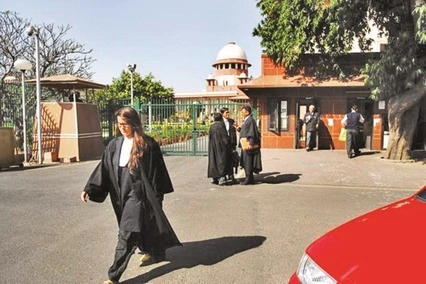By Dr Swati Jindal Garg
Justine Greening, the UK development secretary, was exactly on point when she said: “No country can truly develop if half its population is left behind”—for if you exclude 50 percent of the talent pool, it is no wonder you find yourself in a war for talent. Time and again, it has been said that in order to make better decisions, it is imperative that we have diversity in thinking… and that requires equal gender participation.
Taking note of this, the Supreme Court in its recent order directed for reserving a minimum of 1/3rd seats for women members in the Supreme Court Bar Association (SCBA) from the 2024 elections. The Court further clarified that the said reservation is only to guarantee a minimum number of women, and women members of the SCBA, subject to their eligibility, shall be entitled to contest the election for all the posts in its executive committee.
The ruling was passed by the bench of Justices Surya Kant and KV Viswanathan, in the case Supreme Court Bar Association vs BD Kaushik. Noting that the SCBA is a premier institution and an integral part of the highest judicial forum of the country, the top court was of the view that the norms, eligibility conditions, membership, membership fee structure, etc., for the SCBA cannot be allowed to remain static for decades, and timely reforms to meet the challenges that may confront the institution from time to time are required to be carried out. The Court, however, being mindful, also observed that the same can be introduced only after due consideration of the suggestions from the Bar members. In pursuance of this observation, suggestions were invited from all the members of the Bar, through a public notice on its website in digital form or through hard copy.
The bench further ruled that notwithstanding any resolution passed by the special general body of the SCBA, some of the posts in the executive committee must be reserved for women members of the Bar, thereby directing that before including members for the ensuing election, there shall be reservation for women members of the Bar to the following effect:
- Minimum of 1/3rd seats in the executive committee—three out of nine.
- Minimum 1/3rd out of the senior executive members— two out of six.
- At least one post of the office bearer shall be reserved for a woman candidate exclusively by turn and on a rotation basis.
Pursuant to these directions, in the elections for 2024-2025, the post of treasurer of the executive committee of the SCBA was reserved for women.
Following the Supreme Court order, the Delhi High Court also issued notice on a plea seeking reservation of 33 percent of seats for women lawyers in the elections of the Bar Council of Delhi (BCD), Delhi High Court Bar Association (DHCBA) and all District Bar Associations in the national capital. A division bench, comprising then Acting Chief Justice Manmohan and Justice Tushar Rao Gedela, sought response of the lawyer bodies on the issue.
It cannot be denied that the women lawyers in India are not given due recognition. Since the time India gained indepen-dence, the country has seen a woman prime minister, a president and a chief minister, but there has not been a woman chairperson of the BCD, vice-chairperson, secretary, or ordinary member, except for two women in the history of 64 years, and the situation is same in DHCB and District Bar Associations as well, the plea stated.
Women lawyers feel that the lack of adequate representation of females in the Bar councils and Bar associations is a major obstacle to their growth in the profession and impairs their abilities as many issues specific to their interests can only be fully understood and empathized with by their representatives. While women leaders are both pioneers and visionaries in the corporate world, consistently breaking barriers and setting new standards of excellence, their absence in areas of leadership is clearly seen and felt. The demand for their rise to leadership positions goes beyond merely filling quotas or balancing gender parity; it is about harnessing unique perspectives, resilience, and insights that women alone can offer. Leadership, in its transformative essence, combines strength, empathy and visionary outlook—qualities exemplified by numerous women across multiple spheres of life.
Even though the Women Reservation Act, 2023, promises reservation in Parliament, Indian women have entered an era of strong representation and agenda-setting power at the national level. Slowly but steadily, women’s political participation is receiving recognition, with many females holding top positions. Despite several obstacles, women have in times of need, demonstrated their potential in politics by occupying key posts and are performing beyond expectations wherever they go.
Time and again, it has been felt that women should belong to all the places where key decisions are being made. It shouldn’t be that women are the exceptions, their participation cannot be made optional or one which is akin to ticking all the right boxes. On the contrary, their participation is the key that will unlock all barriers. The change that has now started was long required, and like all other changes, this too will be feared at the beginning. Bill Gates, Microsoft co-founder, was absolutely correct when he said: “People always fear change. People feared electricity when it was invented. Didn’t they?”
At the end of the day, it cannot be denied that gender equality not only liberates women, but also men from the prescribed gender stereotypes. Women too must learn to play the game as men do. Granting equal opportunities and levelling the playing field will go a long way in ensuring that the female perspective is not lost in translation…especially when that translation is done by the men themselves!
—The author is an Advocate-on-Record practising in the Supreme Court, Delhi High Court and all district courts and tribunals in Delhi


